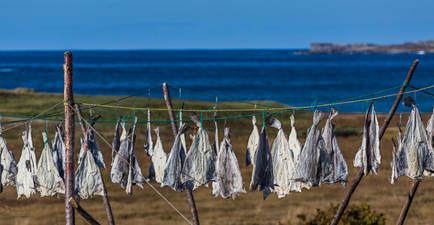Behchokǫ, Northwest Territories

Year(s) Funded: 2012-2013, 2013-2014
Topic Area: Food Security Contact: [email protected] Partners: Rae-Edzo Friendship Centre Website: https://www.tltk.ca Title:
Action: The first phase of this project focused on the importance of traditional foods, specifically caribou, in maintaining physical, spiritual, and emotional health. In so doing the community documented ways in which elders and their families adapt to their limited access to caribou meat partially due to shrinking habitat related to climate change, and the current hunting ban on caribou due low numbers. The second phase was designed to develop and test solutions for mental and physical health problems associated with climate change in Tlicho communities. Data gathered helped the community to understand how wildlife, plants, vegetation and water, in surrounding areas have been impacted. The third phase of the project allowed a research team to a solution that is designed to support a healthy lifestyle while adapting to the effects of climate change. This involved the building of a traditional cabin. Youth, harvesters, and elders came together to discuss where to build this cabin and where to harvest the logs. The cabin is used for safely housing elders and youth where harvesters can carry out their on-the-land activities. The elders can be on the land they know and love, and together with harvesters teach the youth stories and skills. The final phase of this project held a workshop and interviews with Elders, harvesters and youth to gather data that will help the community understand wildlife, plants, vegetation and water in surrounding areas impacted by climate change. The impacts of the loss of caribou due to climate change on health and harvesting restrictions was examined. Both phases of the project addressed three major questions: what traditional foods should be harvested to ensure good physical, spiritual, and emotional health; how does a non-traditional food diet affect physical, spiritual, and emotional health; and, what adaptive strategies did Elders and harvesters recommended addressing the issue around caribou, climate change, and health? Built on Phase 1 of the project, Phase 2 provided a deeper understanding of adaptive strategies that elders and harvesters recommended addressing the interconnected issues of climate change, caribou and health. Both Elders and harvesters were interviewed in their homes, in a focus group, and at traditional camps on the benefits of traditional food. Youth were taught to harvest land-based resources associated with traditional foods and diet, prior to preparing and consuming such food as muskrat, rabbit, fish, and caribou. There was more success in gathering information when elders and harvesters worked closely with the youth. Results: The first phase of this project allowed the community to determine what traditional resources Tlicho should be harvesting and eating to ensure good physical, spiritual and emotional health. A variety of ways to combat health issues related to poor diet and to promoting a healthy traditional diet was explored. Dialogue of traditional knowledge was documented through video. In the second phase of the project the community identified some solutions to help the community maintain a healthy lifestyle while adapting to the impacts of climate change. They also emphasized the importance of traditional harvesting and the use of on-the-land resources to maintain physical, spiritual, and emotional health. In phase three, the community built a traditional cabin for the use of harvesters and intergenerational dialogue. The final phase of the project helped the community gain perspectives on climate change impacts on the community through Elders, harvesters and youths. This enabled the community to gather data that will help community to understand how wildlife, plants, vegetation and water in surrounding areas are impacted. The project provided the community with new tools for understanding the health impacts of climate change in three ways. First, Elders provided knowledge on choosing appropriate traditional foods when caribou are not in the vicinity - food that feeds the physical, spiritual and emotional body. Secondly, health professionals discussed what happens to physical bodies when traditional food - or food similar to traditional foods, rather than processed foods is consumed. Lastly, youth were involved with developing a script and acting in and/or interviewing elders and other members of the community for a video of the health implications of eating traditional foods and processed foods. Outputs: Produced a documentary video discussing traditional foods and a brochure outlining the health benefits of traditional foods. Reports were developed to explain outcomes of workshops and interviews held with community members. A traditional cabin was built for community use of harvesters and a space to conduct intergenerational dialogue. |
